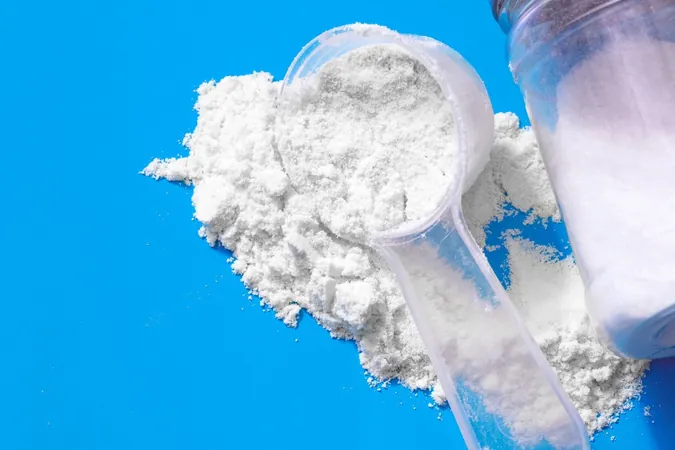
Creatine: The Surprising Truth Behind This Popular Muscle-Building Supplement
2025-03-24
Author: Jessica Wong
Recent research from the University of New South Wales has stirred up controversy in the fitness community, suggesting that creatine—a staple in workout supplementation—may not be the magic bullet for muscle growth that many have believed. The findings, published in the journal Nutrients, challenge long-standing assumptions about the supplement’s effectiveness during resistance training.
The study involved a clinical trial where participants were divided into two groups: one that incorporated a daily dose of creatine (5 grams) and a control group that did not. After 12 weeks of resistance training, the results showed that both groups experienced similar gains in lean body mass—approximately two kilograms—despite the creatine group initially seeing a slight boost in the first week. However, researchers concluded that this initial increase likely stemmed from fluid retention rather than actual muscle growth.
Mandy Hagstrom, an exercise scientist involved in the study, noted that the results indicated the dose used in the trial might not be sufficient for those aiming for significant muscle gains. “Once they started exercising, they saw no additional benefit from creatine, which suggests that five grams per day is not enough if you’re taking it for the purposes of building muscle,” she stated.
This revelation could prompt athletes, bodybuilders, and casual gym-goers to reassess their supplementation strategies. While some past studies have linked creatine intake to improved athletic performance and muscle gains, the UNSW researchers suspect that flaws in those studies—such as starting creatine intake simultaneously with new exercise routines—may have skewed the results.
It's important to note that creatine is naturally found in foods like seafood and red meat, and plays a role in energizing muscles during high-intensity activities. The current findings do not outright dismiss creatine as a helpful supplement but highlight the need for higher doses or longer supplementation periods to witness tangible results. The researchers suggest that a maintenance dose of 10 grams per day could be more effective, and recommend further research to explore varying dosages and treatment durations.
As these findings come to light, fitness enthusiasts are encouraged to manage their expectations. Lead author Imtiaz Desai stressed that “this will hopefully change their perception about what it can help them achieve,” particularly for those who are looking to boost their gym performance. This is especially relevant for professional athletes who might need to carefully consider when and how to take creatine, especially if their sports mandate specific weight categories.
As more studies are conducted, the fitness community will be watching closely for further insights into how to maximize the benefits of creatine and whether newer dosing strategies could finally unlock its full potential as a muscle-building aid. So before you reach for that creatine bottle for your next workout, think twice—your muscles might be waiting longer than expected for the real magic to happen!




 Brasil (PT)
Brasil (PT)
 Canada (EN)
Canada (EN)
 Chile (ES)
Chile (ES)
 Česko (CS)
Česko (CS)
 대한민국 (KO)
대한민국 (KO)
 España (ES)
España (ES)
 France (FR)
France (FR)
 Hong Kong (EN)
Hong Kong (EN)
 Italia (IT)
Italia (IT)
 日本 (JA)
日本 (JA)
 Magyarország (HU)
Magyarország (HU)
 Norge (NO)
Norge (NO)
 Polska (PL)
Polska (PL)
 Schweiz (DE)
Schweiz (DE)
 Singapore (EN)
Singapore (EN)
 Sverige (SV)
Sverige (SV)
 Suomi (FI)
Suomi (FI)
 Türkiye (TR)
Türkiye (TR)
 الإمارات العربية المتحدة (AR)
الإمارات العربية المتحدة (AR)